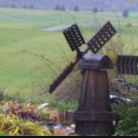
Nature exhibits obvious and dramatic changes right before our eyes. From winter’s dazzling white to its not-so-white coverings of stark-bare limbs of trees reaching out and the dirty-white snow on roadsides… to spring bursting forth with new life in its many-colored splendor as birds bring joyful song to our lives… to the warmth and long-term blooms and verdant green of long summer days… to the casting off of autumn’s multi-colored leaves and darkening skies signaling the portent of dark and dreary days ahead… these are changes we clearly see and can identify with. We understand these changes, even welcome them, as we accept the inevitable in the forward march of time.
We visibly change, too. From the moment we’re born, we continually change... as we grow and mature from infancy on through adulthood and elderhood. We never stop changing as we age, and our appearance gives credence to this process which is as old as time itself.
But what we don’t see are the changes beneath the surface. In nature, it’s the life substance within a plant that moves it forward with growth to change through the seasons. For us, change is evident in our learning processes, our maturation. Just raising a child provides ample evidence of virtually daily change and growth - physically, emotionally and spiritually.
Our physical change and growth are obvious. From helpless newborn to the excitement of childhood growth, learning to do things “myself,” to the physical growth and aging process propelling each of us forward into young adulthood and on through the decades as we become “senior citizens,” change never stops. We know it, we see it, and we feel it.
Emotional change, though, is less obvious, yet still evident in our behavior and reactions as we mature from childish ways and selfish ambition. “When I was a child, I talked like a child, I thought like a child, I reasoned like a child. When I became [an adult], I put childish ways behind me. Now we see but a poor reflection as in a mirror; then we shall see face to face…and now these three remain: faith, hope and love. But the greatest of these is love.” (I Corinthians 13:11-13NIV)
Emotional maturity develops as we process our wins and losses in life… as we learn to share, to understand and appreciate each other, to show empathy for someone else’s situation, to feel pain and loss, to feel and share joy, peace, and more. All these emotions are developed inside, invisible within our thought processes, but are evidenced in our maturing reactions.
And then there is spiritual change in our faith. This, too, is an unseen process of growth and maturation... a change that is often and especially brought about by life’s trials. “Consider it pure joy…whenever you face trials of many kinds, because you know that the testing of your faith develops perseverance. Perseverance must finish its work so that you may be mature and complete, not lacking anything. If any of you lacks wisdom, he should ask God, who gives generously to all…” (James 1:2-5 N IV)
As we grow in our spiritual faith journey, becoming more like Christ, we are constantly learning and understanding, changing our hearts and minds from within. We learn to accept change instead of grumbling and complaining… learn to understand and grow by going through the difficulties rather than simply trying to escape and get out from under the trial. “Trust in the Lord with all your heart, and lean not on your own understanding; in all your ways acknowledge him, and he will make your paths straight.” (Proverbs 3:5-6)
For it’s often that trial with its pain and tears which brings about learning and understanding - a process of growth... as we gracefully accept true change and joy brought about by the difficult and painful journey. And it’s only in that painful journey that we grow under God’s wisdom… as we become either embittered and hardened, or more gentle and kind... an invisible change within our heart, yet visible in our attitude and behavior.
Changes Without and Within
Linda A. Roorda
The birds have hushed their lilting songs
Bright colored flowers have faded away
The trees have turned to brilliant hues
And the sky with clouds is gathering dark.
A silence of sorts ensues with the change
Though here and there a bird can be heard
But ever still grows the ambience
Of nature’s peace midst colors of fall.
Yet what we see belies the fact
That underneath the surface calm
Lies greater change than evidence shows
A turmoil within to stir transition.
For what can’t be seen is the moving force
Behind the progress to destiny’s goal.
So let the heart of every soul
Heed wisdom’s call, accepting its purpose.
This heart of change is all you ask
That humbly I come as You draw me near
To be still and know that You’re in control
As you define Your place in my life.
Inevitable change without and within
As time moves forward on its forever path.
Then what of our heart when the depth is exposed,
Are we bitter in change… or more gentle and kind?
- Read more...
- 0 comments
- 390 views

